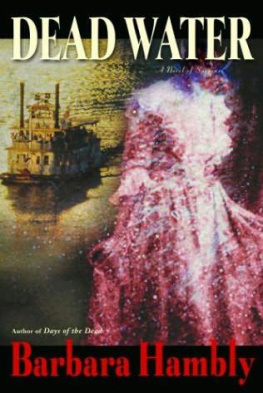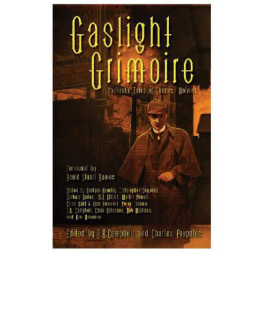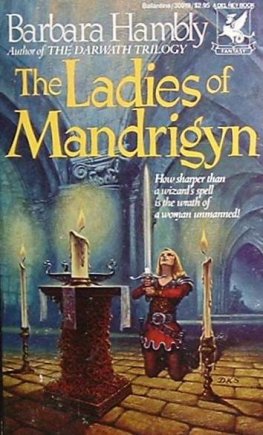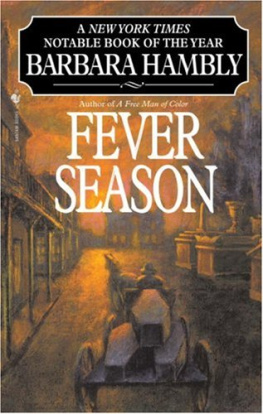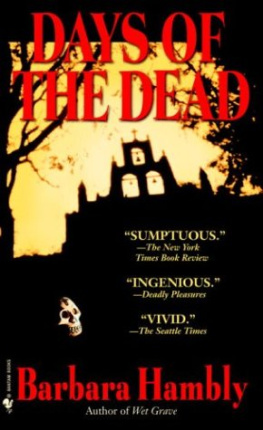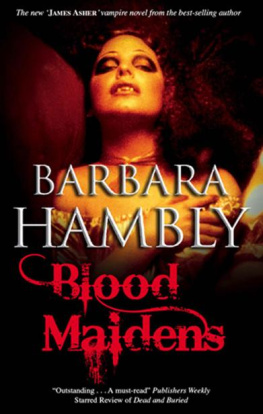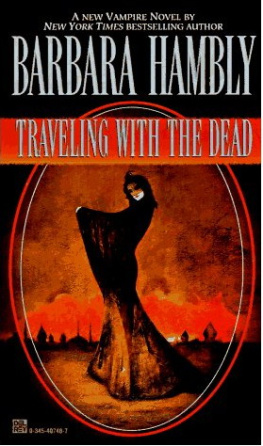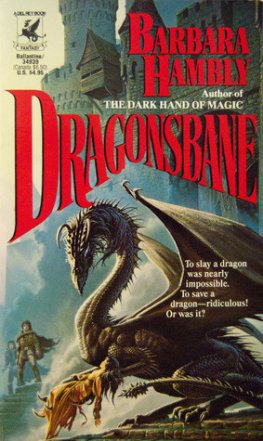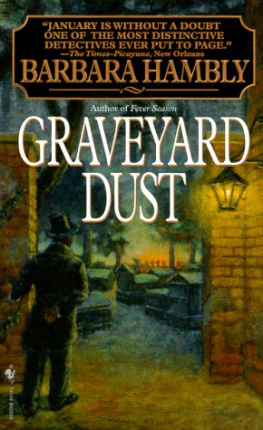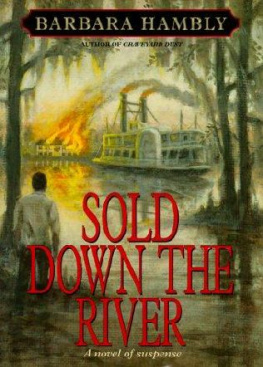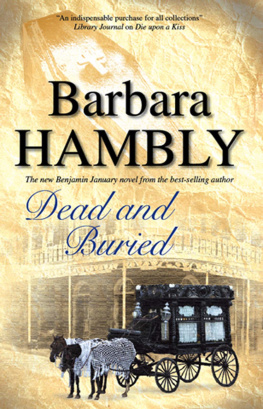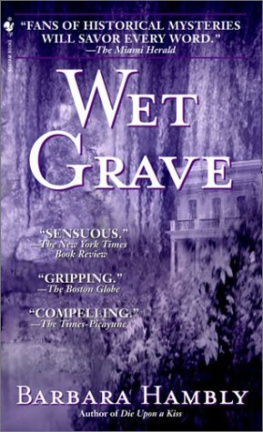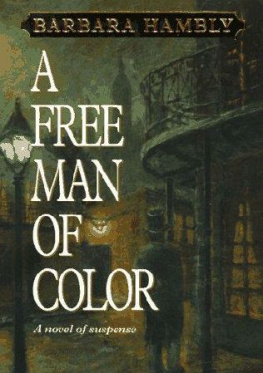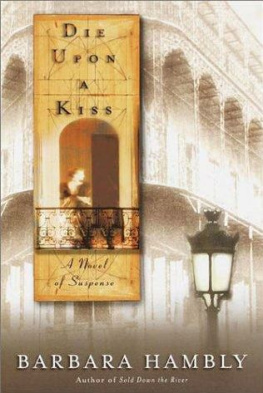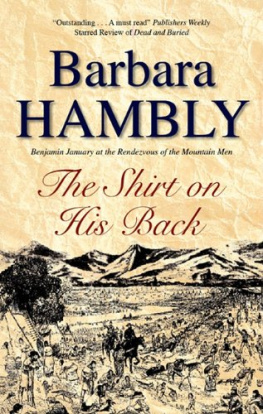Barbara Hambly - Dead Water (Benjamin January, Book 8)
Here you can read online Barbara Hambly - Dead Water (Benjamin January, Book 8) full text of the book (entire story) in english for free. Download pdf and epub, get meaning, cover and reviews about this ebook. year: 2004, publisher: Bantam Books, genre: Detective and thriller. Description of the work, (preface) as well as reviews are available. Best literature library LitArk.com created for fans of good reading and offers a wide selection of genres:
Romance novel
Science fiction
Adventure
Detective
Science
History
Home and family
Prose
Art
Politics
Computer
Non-fiction
Religion
Business
Children
Humor
Choose a favorite category and find really read worthwhile books. Enjoy immersion in the world of imagination, feel the emotions of the characters or learn something new for yourself, make an fascinating discovery.
- Book:Dead Water (Benjamin January, Book 8)
- Author:
- Publisher:Bantam Books
- Genre:
- Year:2004
- Rating:4 / 5
- Favourites:Add to favourites
- Your mark:
- 80
- 1
- 2
- 3
- 4
- 5
Dead Water (Benjamin January, Book 8): summary, description and annotation
We offer to read an annotation, description, summary or preface (depends on what the author of the book "Dead Water (Benjamin January, Book 8)" wrote himself). If you haven't found the necessary information about the book — write in the comments, we will try to find it.
Dead Water (Benjamin January, Book 8) — read online for free the complete book (whole text) full work
Below is the text of the book, divided by pages. System saving the place of the last page read, allows you to conveniently read the book "Dead Water (Benjamin January, Book 8)" online for free, without having to search again every time where you left off. Put a bookmark, and you can go to the page where you finished reading at any time.
Font size:
Interval:
Bookmark:
Also by Barbara Hambly
A Free Man of Color
Fever Season
Graveyard Dust
Sold Down the River
Die Upon a Kiss
Wet Grave
Days of the Dead
STEAMBOATS
The steam-driven packet-boats that plied the waterways of America in the 1830s were hardly the floating palaces of the postCivil War era; they, and the craft of steamboating, differed even from those of the late 1850s immortalized in Mark Twain's Life on the Mississippi. At the time of my story, the era of fancy wooden gingerbread trimmings, gilded antlers on the smokestacks, plush cabin furnishings, and calliopes lay a decade or two in the future. Even the steam whistle had yet to be invented.
Before the post-War era of the railroads, steamboats were the workaday backbone of commerce and transportation. They were plain, generally only two decks high (only later was the hurricane deck surmounted by the topmost texas deck), and resembled barns set on rafts. If they were primarily white, like later steamboats, it was only because whitewash was cheap. Staterooms were minuscule, and in the high-water periods of the cotton and sugar harvests, every square foot of deck-space was likely to be taken up with cargo: freight was given priority, and passengers came in a poor second. During the high-water months most commerce was done by the side-wheelerslarger, more powerful, and more maneuverable. Only in low wateror in shallower waters of lesser rivers and bayousdid the smaller stern-wheelers like the Silver Moon come into their own.
I have tried to describe what steamboat travel must have been like in the 1830s, when the Mississippi River was innocent of locks, flood control, uniform levees, or any variety of snag-clearance (or safety regulations for steamboat passengers). Even before the Civil War, railroads had begun to undercut the steamboats' monopoly on freight and to disrupt uninhibited navigation with bridges.
COLONEL DAVIS
In the summer of 1836, when Dead Water takes place, Jefferson Davis was twenty-eight years old and just embarking on a career as a planter at Brierfield on Davis's Bend of the Mississippi. He had been widowed less than a year before by the death of his young bride of three months, Sarah Knox Taylor (called Knox), the daughter of his former commanding officerand future PresidentZachary Taylor. Davis had already commanded troops in the Black Hawk War, though as far as anyone has ever been able to prove, he never encountered militia Captain Abraham Lincoln during that conflict.
In the mid-1840s Davis entered politics and re-married, to a young lady named Varina Howell. When the Mexican War broke out in 1846, he accepted a commission as Colonel and went on to become a war hero, a Senator, and Secretary of War to President Franklin Pierce, a career that culminated in his five-year term as the only President of the Confederate States of America.
James Pemberton became the overseer at Brierfield in Davis's absence, a position he held until his death in 1850.
Davis is universally described as a fair and kind master to his slaves.
ABOUT THE AUTHOR
BARBARA HAMBLY lives in Los Angeles, where she is at work on a novel about Mary Todd Lincoln, The Emancipator's Wife, which Bantam will publish in 2005.

ONE
Six days out of seven, the ten thousand or so people in the city of New Orleans whose bodies were the property of other people were kept pretty busy. Having no legal right to choose what they'd rather be doing, they tended to get the dirty jobs, like mucking out stables, cleaning the always-horrifying three-foot gutters that rimmed the downtown streets, cooking everybody's food in sweltering kitchens, and washing everybody's clothing, and getting damn little thanks for any of itthey were better off doing white people's chores than living in heathen villages in Africa like their ancestors (said the white people).
Sunday afternoons, the slaves got together in what was officially called Circus Squareunofficially, Congo Squarenext to the turning basin where the canal-boats maneuvered, and close by the old St. Louis Cemetery. Those who had garden plots sold their surplus produce: tomatoes and corn, this time of year, and peaches whose scent turned the thick hot air around them to molten gold. Old women peddled gumbo for a penny or two a bowl, or bread, or pralines: brown, pink, or white. Old men sat under the plane-trees around the square's edge and told stories to the children, about Compair Lapin the rabbit and ugly stupid Bouki the Hyena, and High John the Conqueror, who always got the better of the whites.
Always, someone played the drums. Ancient rhythms flowed and leaped through the American dust, rhythms passed down from mothers or fathers or grandparents who'd been taken from African shoreseven the modern tunes were quirked into African syncopation.
Always there was dancing, the men turning the women under their arms, leaping and slapping their feet, wriggling in doubled and quadrupled rhythms, styling to show off what they could do. Ankle-bells jangled, hands clapped. Voices shouted encouragement, and when the sun glanced low over the slate roofs of the pastel town and flashed like a burning sword blade on the river, then Mamzelle Marie would comeMarie Laveau, the Queen of all the voodoosand dance with her snake, and sing the songs of her power and her triumph.
At the gates of the paling fence that circled Congo Square, Benjamin January stood watching the voodoo queen dance in the twilight.
I walk on pins,
I walk on needles,
I walk on gilded splinters;
I want to see what they can do....
January had met the voodoo queen soon after he'd returned to New Orleans from France, where he'd lived for sixteen years. Then, as nowthree years ago, that wasthe summer heat had lain on the town like a damp and itchy blanket, but in that summer three years ago had come not only the usual yellow fever, but the cholera, too. It was the cholera that had brought January back to New Orleans, the cholera that had taken the life of his wife in Paris, that had driven him, half-crazy with grief, home to this city of his birth. When he'd gone to France in 1817 to study surgery, he had vowed he'd never return to the land where he'd been born a slave, where, despite his freedom, the color of his skin still dictated what he could and could not do.
Yet here he was, he thought as he watched Mamzelle Marie raise the seven-foot kingsnake high above her headas he watched the reptile slip and coil down her arms to wrap around her bronze throat and the bosom half-covered by her red cotton blouse.
Back in New Orleans.
Back with his familywith the mother who strove to pretend she'd never been a slave herself, or borne two children to a slave. With the one sister who was a rich white man's mistress, and the other sister whom he now hoped to find here, somewhere, in this moving mass of dancers.
Back home. And married againthe thought still filled him with wondermentto a lady named Rose, who'd been no more than a gawky, nearsighted schoolgirl when he'd left New Orleans all those years ago.
He slipped his hand into the pocket of his scruffy corduroy jacket, touched the thing Rose had handed him that morning, bony and nasty even through wrappings of bandanna and newspaper.
The gallery where they customarily had breakfast overlooked the narrow courtyard of that creaky old Spanish house on Rue Esplanade that for eight and a half months now had been their home. Rose had been upstairs, helping Cosette packCosette, who had boarded with them for four of those eight months as a pupil in the school Rose had established. So far they'd had only three pupils. OneMarie-Annehad departed a few days previously, to join her mother in a cottage by the lake rented by her mother's white protector. The youngest, Germaine, shared bread and coffee with January on the gallery. Ten years old and a fragile little miracle of ladylike deportment, she had a creamy dark complexion and African eyes that made her look like some ancient Pharaoh's daughter inexplicably masquerading in ruffles and lace. Germaine's mother, also a rich white man's plae, was coming for her that afternoon. The morning air was silky, before the day's brutal heat began, and scented with caf au lait.
Next pageFont size:
Interval:
Bookmark:
Similar books «Dead Water (Benjamin January, Book 8)»
Look at similar books to Dead Water (Benjamin January, Book 8). We have selected literature similar in name and meaning in the hope of providing readers with more options to find new, interesting, not yet read works.
Discussion, reviews of the book Dead Water (Benjamin January, Book 8) and just readers' own opinions. Leave your comments, write what you think about the work, its meaning or the main characters. Specify what exactly you liked and what you didn't like, and why you think so.

